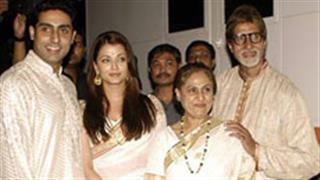Shah Rukh Khan had initially resisted playing the lead in Aditya Chopra's "Dilwale Dulhania Le Jayenge", the 1995 mega hit that created his screen persona of a yuppie romantic hero, says film critic Anupama Chopra in her biography on the Bollywood superstar.
The actor enjoys stardom, but gets creative satisfaction from playing diverse, unconventional roles, Chopra says in "King of Bollywood: Shah Rukh Khan and the Seductive World of Indian Cinema" that was launched in New York last week.
She says that "Darr" led him to the Yash Chopra-Karan Johar camp. "Kuch Kuch Hota Hai" and "Dil To Paagal Hai" built upon the "Dilwale..." persona.
Shah Rukh tried to break his image of lover boy in candyfloss romances with his home production "Phir Bhi Dil Hai Hindustani" and "Asoka". But both failed to get critical or commercial success. Therefore, playing the weak, dipsomaniac tragic hero in Sanjay Leela Bhansali's "Devdas" (2002) energised SRK. He found it challenging as well.
"His performance was measured against Dilip Kumar's quietly searing intensity and deemed compelling. With 'Devdas', Shah Rukh reconstructed his own myth," writes Chopra.
After that he was able to do the roles he liked. In "Swades" he played a NASA scientist who returns to his roots and finds a mission in life. In "Don", he was bad once again after "Baazigar" and "Darr". Now in "Chak De India", he plays a hockey coach, and, at 40 plus, his own age.
Chopra has avowedly written the book not as another SRK biography, but as a portrait of India finding its identity and of Bollywood, seen through SRK's life and films.
What holds the reader's interest in the book is the new information about SRK's life.
During the Q&A session that followed the screening of her interview with SRK at the book release function, she mentioned two little known facts - that Shah Rukh's father Meer too had come to Mumbai in the 1950s to become an actor, but returned to Delhi disappointed.
Second, SRK's first film role came in "In Which Annie Gives it Those Ones", written by Arundhati Roy, who later won the Booker Prize, and directed by Pradip Kishen. It was a walk on part!
Published by Warner Books, "King of Bollywood" is the first book on India's billion-dollar film industry published in the US. It has come at a time when the Hindi film industry is extending its global footprint, is taken seriously by the international film festival circuit and academia, and is even wooed by Hollywood.
Sanjay Leela Bhansali's "Saawariya" is produced by Sony. Salman Khan-Ali Larter starrer "Marigold" is a Bollywood style film made by a Hollywood director.
And Chopra credits SRK for making Hindi films popular outside India, mainly to the Indian diaspora.
SRK told her in the video interview promoting her book that he has no need to go to Hollywood for bigger audiences when Hindi films' audience itself is multiplying.
To decode SRK's mystique that made him a superstar after Amitabh Bachchan, Anupama refers to the Big B's Vijay character in his films.
"Fans rarely thought of Vijay and Amitabh Bachchan as one. Vijay was working class, seething, and sometimes brutal. Amitabh, in person, was highly cultured and sophisticated.
"But with Shah Rukh, the distance between the actor and image blurred. The audience believed that Shah Rukh was Raj (his character in 'Dilwale...'. He every girl's fantasy lover, every sister's brother, every mother's son. In short, a superstar."
About SRK's histrionic ability, however, Chopra has her doubts.
"The jury is still out on that," she said at the book release function.
'SRK didn't want to do DDLJ'
Monday, August 13, 2007 13:30 IST

















